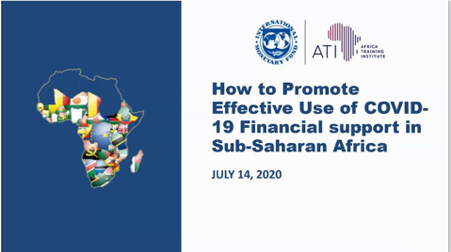The Economic Governance Platform has participated in an International Monetary Fund (IMF) Webinar titled ‘Promoting Effective Use of COVID-19 Finances in Africa: An IMF Discussion with African CSOs’.
The expectations of this conference were to critically examine the IMFs support to help countries cope with the COVID-19 pandemic; to ignite the debate on the best approaches to offer support to these countries looking at how this could further influence policies that mitigate some of the key challenges faced, and to listen to Civil Society Organisations’ (CSOs) suggestions about safeguards that should be attached to COVID-19 funding in the key areas of transparency and accountability.
Participants were welcomed to the discussion by IMF senior staff and the first part of this discussion was moderated by Abdoul Aziz Wane, Director of the Africa Training Institute, IMF, who gave a brief introduction on the purpose of the seminar as well as the agenda for discussion.
In giving an overview of what the discussion was about, the speakers Abebe Aemro Selassie, Director African Department, IMF; Rhoda Weeks-Brown, Director Legal Department, IMF; and Vitor Gaspar, Director, Fiscal Affairs Department, IMF, presented the IMF’s new framework for Enhanced Engagement on Governance and also outlined the main traits of a successful use of COVID-19 financing.
In their remarks, they called upon national governments to ‘keep the receipts’ of their COVID-19 expenditures.
Beauty Emefa Narteh, Executive Secretary of the Ghana Anti-Corruption Coalition outlined CSOs’ expectations on the governance of emergency financing and offer considerations for striking a good balance between providing rapid financing to save lives and livelihoods and taking time to design safeguard conditionality.
The discussion was split into two panel discussions with the first discussing Good Governance Standards for Emergency Financing – moderated by Austin Ndiokwelu of International Budget Partnership-Nigeria.
The two main topics for this panel were “Good PFM Practices” which was led by Julius Mukunda, Director, Civil Society Budget Advocacy Group, Uganda and Anti-corruption Infrastructure and Transparency led by Chenai Mukumba, Country Coordinator, Consumer Unity and Trust Society, Zambia.
This panel examined and discussed the conditions the IMF could include in its emergency financing programs to ensure resources are used effectively to meet their proposed purpose. Presentations in the form of an interactive brainstorming session saw participants outline problems and suggest solutions including how the IMF can contribute positively to solve the aforementioned.
The second panel discussion was moderated by Monica Kirya of U4 Anti-Corruption Resource Centre and it focused on a theme titled ‘The Need For Verification and the Role of CSOs’.
This panel drew on a series of questions in which local CSO leaders were identified as a contributor for each of the questions asked. For each question Ms Kirva selected between 2 and 3 CSO members who spoke for about five minutes on the selected question which they had come to the discussion with prepared responses.
The questions discussed included;
- What is the role of CSOs in the verification and monitoring of Government commitments to use emergency funding soundly and transparently?
- What can CSOs do and what can’t they do to help monitor government compliance with its commitments to the Fund in connection with Covid-19 funding? What are CSOs’ constraints in this area?
- What can the Fund do to help put CSOs in a position to effectively assist governments monitor and verify compliance with the governance conditions on Covid-19 emergency financing?
This session also featured a short Q&A session in which IMF staff addressed specific remarks made by CSO representatives and the closing addresses were made by Paul Banoba, Africa Regional, Transparency International and Edward Gemayel, Advisor, African Department, IMF.
The Economic Governance Platform, previously the Civil Society Platform on the IMF Programm, seeks to consolidate efforts and broaden its mandate of protecting the interest of citizens and holding government accountable beyond the IMF programme in 2019.
The newly structured Platform will provide CSOs, NGOs and Think-Tanks in the country with a common voice and position on broader finance and economic management issues to ensure an effective and efficient public financial management system in Ghana. By objectively looking at the trade-offs, the ups and downs of government policies and provide useful feedback in promoting the national good.










